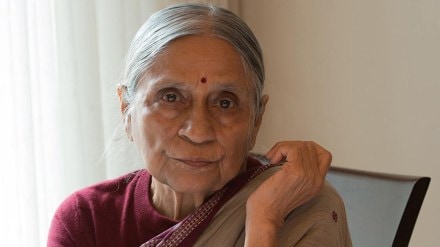“She is hardly seen, very soft spoken and looks frail. I have never seen her raise her decibel levels, never seen her thump tables and she looks like a woman who would not even harm a fly. But she is made of steely resolve and has been steadfastly working with the women of Gujarat for the entire part of her working lifetime.” Too shocked to respond impromptu to the news of Ela Bhatt’s passing away on Wednesday, November 2nd afternoon, M S Sriram, could only pull out what he had written about the Elaben he always knew too well. Much like the good professor at the Indian Institute of Management (IIM) Bangalore and an expert in the social impact arena, many who knew Elaben were taking time to sync into the reality of the moment. Many knew that she was 90, had suffered a stroke too but then got back. However, she has been ailing in the recent past.
Till very recent, she was also the chancellor of Gujarat Vidyapith, an over 100 year old institution that was founded by Mahatma Gandhi. It has been a long and arduous journey working all along for poor working women. She started out first as a young lawyer working for a trade union – Textile Labour Association.
Elaben, always seen in her Khadi saree and headed for her meetings in autorickshaws, has been a recipient of several awards and honours, the Magasasay Award for community service, the Padmashri and Padmabhushan award apart from a stint as a member of the Rajya Sabha and a hard to miss doctorate from Harvard and Yale.
Also Read: In Hillary Clinton’s words, inspiring story of Ela Bhatt who changed 2 million lives
She founded SEWA in 1972 and SEWA Bank in 1974. She has been associated with several social entities like cooperatives, Sa-Dhan (the self-regulatory organisation for the microfinance sector), was the first president of the Indian arm of the Friends of Women’s World Banking. The link node across all her initiatives have been how to ensure better livelihoods to self employed poor women so that can lead a self reliant existence.
What stood for all along and was deeply involved in was in organising poor self employed women into a union so that they could get their basic rights without harassment. Think of these as benefits that a formal sector would typically give to employees. Only, here it was for the poor self employment women working in the informal sector – be it vending stuff on the pavements or selling fruits and vegetables on a pushcart. These could include benefits like access to social security, gratuity, insurance and other such benefits normally associated with the formal sector.
Speaking to this writer long back and talking about another social impact icon of Gujarat and India’s celebrated white revolution guru Verghese Kurien, Ela Bhatt had said: “By 1991, NDDB was into surplus production and there was a proposal that it should export the surplus. I suggested it would be better if the excess milk was distributed among anganwadi workers’ children.”
Her mind and heart were clearly aligned. Or as Professor Sriram would puts it: “ One has never seen Elaben in the gender brigade shouting for the rights of women. Rather she is seen working for the cause of the poor first, and within the poor, the women.”In fact, Sriram recalls her saying: “I was open to the idea of men joining our union struggles, because I felt that they would lend more strength to SEWA’ however, the women emphatically refused. They said they would feel inhibited with men around, and they believed men would dominate and create tensions.” This true proponent of deliberative thinking driven by a larger purpose will be dearly missed.
